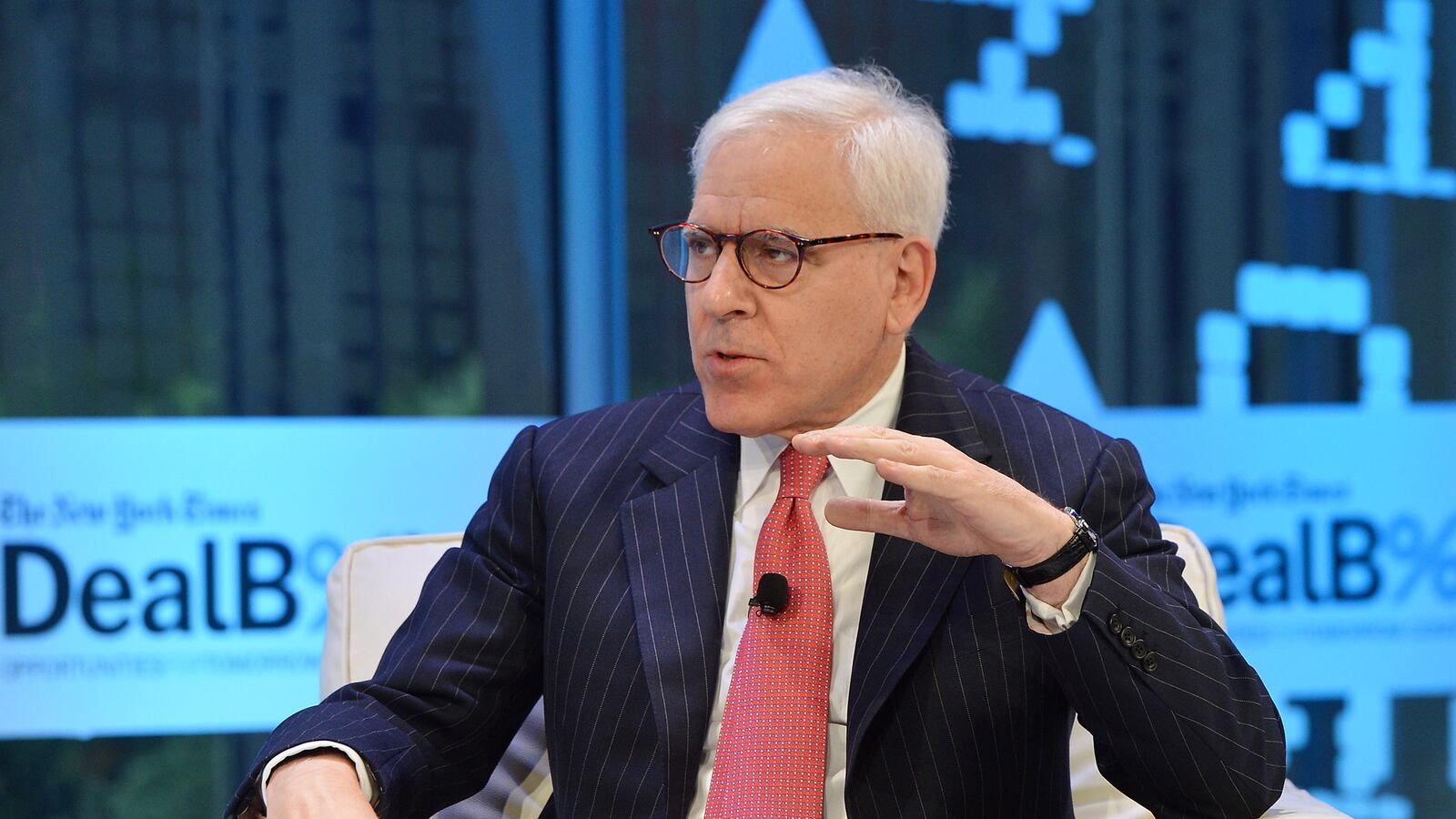Markets are on a roll, with the Dow Jones Industrial Average at a record high. Interest rates are very low. Inflation is non-existent. The rich have never been richer. These are very good times indeed to be a big-shot financier.

And yet. The crown rests uneasily on the heads of the titans of finance. They’re concerned about America’s past and future, they’re worried about their status, and they’re looking in all sorts of unlikely places for bliss. That’s my takeaway from spending the day at the New York Times DealBook Conference.
“Gun to my head, I’m optimistic,” said Lloyd Blankfein, the chief executive officer of Goldman, Sachs, which is not exactly a ringing endorsement of the status quo. David Rubenstein, head of the Carlyle Group, spoke of opportunities his firm was finding in Africa, India, and China—not so much at home. Ray Dalio, the head honcho at Bridgewater, the massive hedge fund with the strange corporate culture, said we’re in an era of low returns in which stocks should rise about four percent a year while bonds could lose money.
“I’m actually very confused now,” said Larry Fink, chief executive officer of Blackrock, which controls a whopping $4 trillion in assets. Why? Even though stocks have rallied impressively this year, there is still a lot of money sitting on the sidelines. Which means “we could see this incredible upward draft in the marketplace,” he said. (Good!) Alternatively, “I could see a scenario where we have a 12 percent correction.” (Bad!)
Fink ran through a litany of concerns: China, Japan, “the nonsense in Washington,” the Federal Reserve. Fink, a Democrat, generally defended the Obama administration’s outreach to the business community, citing the large number of meetings that business leaders have held with the president and other top officials. “I think they’re reaching out more than any White House in recent times” he said. Big bankers are also nervous, because, as Fink put it, “society is still angry at banks,” and because the financial penalties inflicted on them in recent years have been rather severe.
Some of the personalities causing uncertainty for big Wall Streeters were part of the conference. Like Dan Loeb, the activist investor who has been disrupting corporate boards—Yahoo!, Sony, Sotheby’s. Loeb, a yoga-practicing surfer and fitness nut, possesses the kind of certainty that eludes many of his elders. “I can’t think of a time in our experience where we misstepped,” he said. Loeb is of a breed of hedge fund investors who have a large amount of assets and a willingness and ability to use the media so that they can rattle the cages of even the largest blue-chip companies. At the conference, Loeb said he now has a position in Federal Express, the giant delivery service that is worth $43 billion.
Another source of angst took the stage after Loeb: Preet Bharara, the aggressive U.S. Attorney for the South District of New York, who has been pursuing and nailing insider traders and bankers. The audience didn’t applaud when he took the stage. (Many probably believed he would emerge from the side carrying a pike with the head of a banker.) Bharara is part of a new regulatory regime, which includes SEC Chairwoman Mary Jo White, that is taking many fewer prisoners in its quest for giant settlements and admissions of wrongdoing. But Bharara came across as mild-mannered and relatable. He won over the audience with charm, joking about his rich brother, Vinit Bharara, who sold Diapers.com to Amazon.com for $540 million. When asked by Peter Lattman of the New York Times what he would do after leaving government service, Bharara responded that he would : “walk the earth like Caine in Kung Fu,” and have “adventures.”
Bharara wasn’t the only big shot expressing a desire to check out for a while. “If I was 22 years old and didn’t know what I wanted to do, I’d move to Mexico,” Larry Fink of Blackrock told interviewer Andrew Ross Sorkin. But you won’t catch Fink eating fish tacos and drinking Coronas on the Sea of Cortez. Rather, he thinks the economic opportunities south of the border are great, especially if Mexico reforms its energy sector.
But others made the case for chilling out—in their offices if necessary. Dalio of Bridgewater, which has been one of the most successful hedge funds in the modern era, suggested to his colleagues that the best stock may be an effort to take stock of what’s happening inside your head. Meditation, he said, is a “simple exercise [that] lets you clear your head and bring equanimity to everything.” On some days, Dalio will check out for 20 minutes to look deep inside. “It’s such a great investment. I’d say that more than any other factor having any effect on my success. It’s been meditation.”





